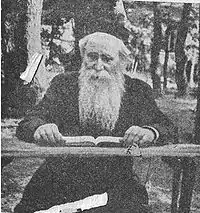Hillel Zeitlin
Hillel Zeitlin (1871–1942) was a Yiddish and Hebrew writer and poet. A leading pre-Holocaust Jewish journalist, he edited the Yiddish newspaper Moment, among other literary activities. He was the leading thinker in the movement of pre-World War II "philosophical neo-Hasidism".[1]

Biography
He was born in the Mogilev Governorate of the Russian Empire (present-day Gomel Region of Belarus) to a Chassidic Chabad family. Already in his childhood, he was recognized for his particularly sharp and analytical mind. When Zeiltin turned 15, his father died and he decided to become a Hebrew teacher.
His exit from the world of the Yeshiva exposed him to the works of the scholars of the Enlightenment. He began studying in earnest the works of both Jewish philosophers (Maimonides, Gersonides, Spinoza etc.) and non-Jewish ones such as Schopenhauer, Nietzsche and others. During this period in his life, he began questioning his religious beliefs and eventually drifted toward secularism.
After World War I, Zeitlin gradually returned to tradition and began leading an Orthodox lifestyle. The reason(s) for this drastic change in his life is not completely clear but may have had something to do with the suffering of Jews during the war. In any case, he shifted from a tragic philosophical outlook to a mystical and spiritual viewpoint. At the same time, Zeitlin remained independent and unconventional in his beliefs and actions. He did not, for instance, hesitate to eulogize his former friend the great writer and thinker Yosef Haim Brenner, who was an ardent secularist.
Zeitlin quoted a wide variety of Hasidic sources, but did not live in a Hasidic community or identify with a particular Hasidic group (although he did visit several prominent Hasidic Rebbes). Zeitlin endeavored to preserve what he called the "treasure" at the core of Hasidic teaching (which he considered to be obscured in his day by pseudo-intellectual trivialities and excessive concern for outward appearance), and to make it accessible not only to Jews of his era but to non-Jews. He considered the core of Hasidim to consist of three "loves": love of God, of Torah, and of Israel. Just as his intended audience consisted of assimilated Jews and non-Jews, he adopted novel formulations of these loves: "love of Torah" would come to encompass inspiring works of "secular" art and literature, while "love of Israel" would be transformed into "love of humanity" (despite which Israel would still be recognized as the "firstborn child of God"). Zeitlin's religious ideal also contained a socialist element: the Hasidim he pictured would refuse to take advantage of workers.[2]
Zeitlin also grew close to the territorialist movement and lent his support to the "Uganda proposal". Zeitlin was of the opinion that it would be impossible to settle in Palestine without removing the half a million Palestinian Arabs and so the Zionist proposals would fail.[3] He was a practical territorialist and his writings took on more urgency after the notorious pogroms in Kishinev and Homel.
When the Nazis began the genocide of Jewish People in Poland in 1942, Zeitlin was 71 years old. He was murdered by Nazis in the Warsaw ghetto[4] while holding a book of the Zohar and wrapped in a Tallit and Tefillin. Most of his family was also murdered; the only survivor was his elder son Aaron, who had settled in New York in 1939.
His sons, Aaron Zeitlin (1898-1973) and Elchanan Zeitlin (1900-1942), were also Yiddish writers.
Footnotes
- Green, Arthur; Mayse, Ariel Evan (March 8, 2016). "'The Great Call of the Hour': Hillel Zeitlin's Yiddish Writings on Yavneh". In Geveb. Retrieved 2019-11-10.
- Mayse, Ariel Evan (December 19, 2018). "The Development of Neo-Hasidism: Echoes and Repercussions – Part I: Introduction, Hillel Zeitlin, and Martin Buber". Lehrhaus. thelehrhaus.com. Retrieved 2019-11-10.
- Shapira, Anita (1999). Land and Power: The Zionist Resort to Force, 1881-1948. Stanford University Press. ISBN 0-8047-3776-2. p 46.
- Fine, Lawrence; Fishbane, Eitan; Rose, Or N (2010). Jewish Mysticism and the Spiritual Life: Classical Texts, Contemporary Reflections. Jewish Lights Publishing. p. 26. ISBN 978-1-58023-434-4.
Bibliography
- Bar-On, Shraga, "Hillel Zeitlin in Search of God: An Analysis of Zeitlin's Meditation ‘The Thirst’", in: D. Schwartz and A. Sagi (eds.), Faith: Jewish Perspectives (Boston: Academic Studies Press, 2013), pp. 478-499.
- Green, Arthur (2012). Hasidic Spirituality for a New Era: The Religious Writings of Hillel Zeitlin. The Classics of Western Spirituality. New York: Paulist Press.
- Meir, Jonatan, "Hillel Zeitlin's Zohar: The History of a Translation and Commentary Project", Kabbalah: Journal for the Study of Jewish Mystical Texts 10 (2004): pp. 119–157. In Hebrew.
- Shapira, Anita (1999). Land and Power: The Zionist Resort to Force, 1881-1948. Stanford University Press. ISBN 0-8047-3776-2.
- Zeitlin, Hillel; Meir, Jonatan (2006). Rabbi Nahman of Bratslav: World Weariness and Longing for the Messiah. Two essays by Hillel Zeitlin; introduction and critical notes by Jonatan Meir. Yeriot: Essays and Papers in the Jewish Studies Bearing on the Humanities and the Social Sciences, no. 5. Jerusalem: Ornah Hes. In Hebrew.